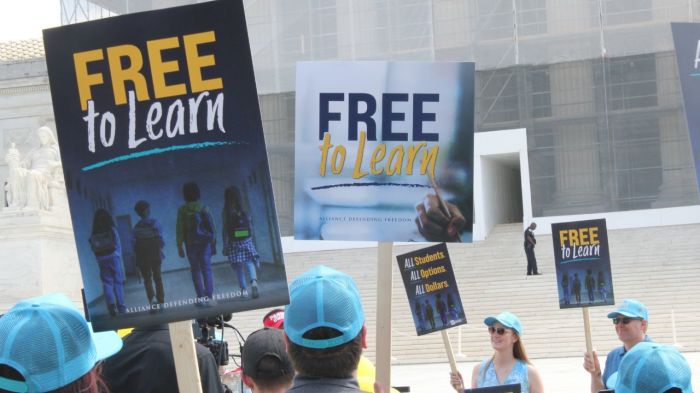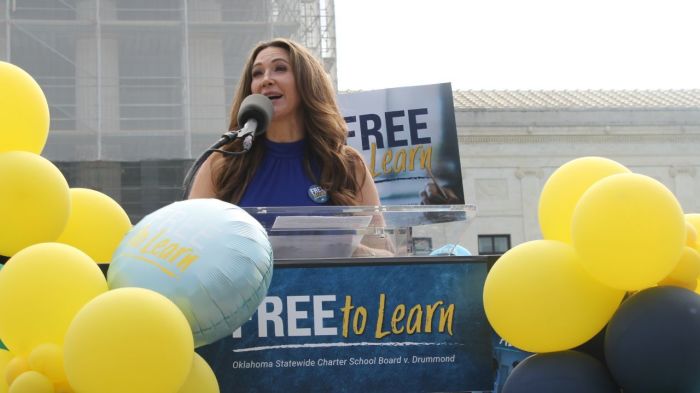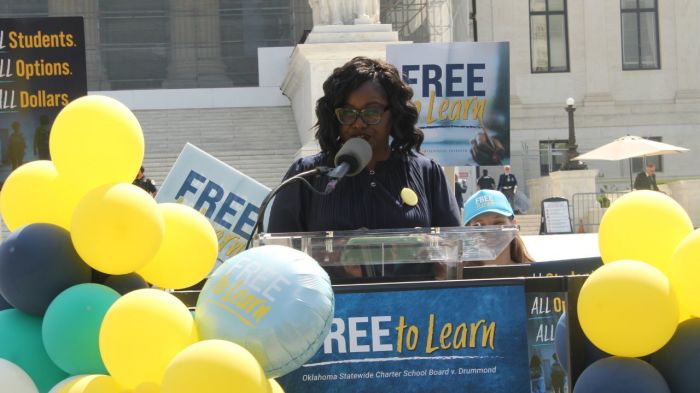
WASHINGTON — In 2021, Kandice Jeske’s son was diagnosed with dyslexia, a learning disability that can cause difficulties with reading, writing and paying attention. Her son’s public school teachers worked with the child to the best of their ability, but the administrators didn’t believe the boy had different needs.
“They told us again and again that he was just not paying attention and that we needed to read more at home,” the Oklahoma City area mother of three told The Christian Post Wednesday as she joined the Free to Learn rally outside the Supreme Court in favor of a Catholic charter school that the Oklahoma Supreme Court has deemed unlawful to be funded by tax dollars.
Remembering how she tried reading with her son every night for an hour, she said there would be “meltdowns every single night.”
“How frustrating would it be to try to go to work? School is his job. So, he’s already working for six to seven hours a day and then coming home and being frustrated for another hour,” she remembered.

Jeske eventually started searching for other schooling options for her son after she saw that he wasn’t receiving the attention that he needed in the public school system. Once she transferred her son to another school, Jeske noticed that his confidence and academic performance improved.
Jeske believes supporting the religious charter school would award more rights to parents, as they would have the option of sending their children to a religious or secular school.
“No one is forcing your child to go to a religious school,” Jeske told CP. “The parent is choosing. The parent knows their kids’ needs. The parent knows their family values. Nothing is forced.”
Dozens of school choice advocates, including speakers from the advocacy group EdChoice, demonstrated outside the nation’s high court amid oral arguments in Oklahoma Statewide Charter School Board v. Drummond.
The issue is whether the state can contract with two Catholic Church regional bodies to operate a taxpayer-funded online charter school known as St. Isidore of Seville Catholic Virtual School.
Oklahoma Attorney General Gentner Drummond, a Republican, sued the state board for approving the creation of the Catholic charter school. He considered a state-sponsored religious school to be “a serious threat to the religious liberty of all four million Oklahomans.” Last June, the Oklahoma Supreme Court ruled 7-1 that it is unlawful to publicly fund a religious charter school.
“The framers’ intent is clear: the state is prohibited from using public money for the ‘use, benefit or support of a sect or system of religion,'” the opinion stated. “The St. Isidore Contract violates the plain terms of Article 2, Section 5 of the Oklahoma Constitution.”
School choice advocates have argued that parents should have more learning options for their children, not fewer, and they want to see the court rule in favor of St. Isidore.
Critics, including some conservative Christians, contend that private funding shouldn’t support religious schools because Americans should not be required to fund the propagation of religious views they disagree with.

But Yalonda Chandler, a former public school teacher who launched a faith-based homeschooling support group and microschool in Alabama, Legacy Builders Academy, believes there’s room for both religious and secular schools in the United States.
“One of the things that I spend a lot of time with my children and my students is that we start every week with Bible study. And that’s not just because I enjoy teaching Bible study, but it also shapes their worldview,” the teacher told CP.
“So they can have a solid foundation, not only in their relationships with each other but also in how they develop as adults,” she added.
The advocate left the public school system around 14 years ago and started homeschooling her own children, later founding the Legacy Builders Academy in the fall of 2023.
Chandler currently has seven students enrolled in the Legacy Builders Academy, and she hopes to see the program expand.
One of the benefits of the learning environment at Legacy Builders Academy, according to the teacher, is that it allows students to receive individualized attention. The special focus on students’ needs makes it hard for anyone to “fall through the cracks,” Chandler said.
During oral arguments, several conservative justices on the court appeared sympathetic to the position that the Catholic Church has the same right as any other private group in Oklahoma to operate a charter school.
The liberal justices argued that the government backing a faith-based charter school would violate the First Amendment, which prohibits the government from establishing a favored religion.
Dr. Richard Land, a former president of the Southern Baptist Convention’s Ethics and Religious Liberty Commission, wrote in March that a ruling in favor of the Catholic charter school would “break revolutionary new ground in the debate over separation of church and state.”
“Ever since the Zelman v. Simmons-Harris (2002) decision, the Supreme Court has ruled that vouchers or tax credits used by parents to help defray the costs of private education did not violate the Establishment Clause of the First Amendment because the aid went to the parents and they then chose whether to spend the money at a religious or a secular school,” Land, the executive editor of The Christian Post, wrote in an op-ed.
“In the present Drummond case, public funds would be directly funding a charter public school, a school operated by Catholic officials to propagate the Catholic faith. While non-Catholic students could apply and attend this school, they would be taught within a framework that promoted the Catholic faith. (Let me be clear that I would oppose a ‘Baptist’ charter school just as vehemently as I oppose a Catholic charter school. Indeed, I would oppose it because I am a Baptist and I believe in separation of church and state.).”
“What is being proposed is a public school paid for with public tax money,” he continued. “Consequently, all taxpayers, whatever their faith commitment or lack thereof, would be forced to subsidize that which they believe violates their faith affirmations.”
Samantha Kamman is a reporter for The Christian Post. She can be reached at: samantha.kamman@christianpost.com. Follow her on Twitter: @Samantha_Kamman









